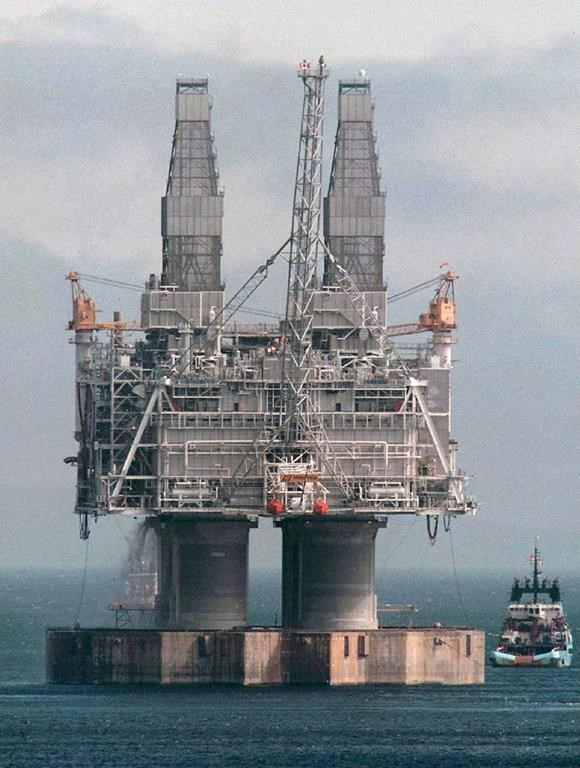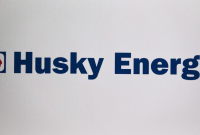Support strong Canadian climate journalism for 2025
The chairman of Newfoundland and Labrador's offshore oil industry regulator says back-to-back spills from the Hibernia platform over the last month represent a concerning failure to meet obligations to protect the environment.
An estimated 2,200 litres of oil spilled into the ocean southeast of St. John's during a power outage on Saturday, according to the Hibernia Management and Development Company.
The incident followed a 12,000-litre spill from the same platform a month earlier. The latest spill came two days after production resumed following the July 17 incident.
The reported volume of oil released on Saturday may seem relatively small, but the incident fits into a pattern, including a 250,000-litre spill from Husky's SeaRose platform last fall, that has renewed calls for regulatory reform.
Scott Tessier of the Canada-Newfoundland and Labrador Offshore Petroleum Board said he's unhappy with the spate of incidents but remains confident in the regulator's ability to improve industry performance.
"I'm certainly unhappy with industry performance," Tessier said. "What I can assure the public is that we're on top of it."
He said cleanup efforts are underway, but recovering oil from water is "very difficult," which is why the regulator emphasizes spill prevention. "It's not a zero risk activity that we regulate," he said.
The Hibernia platform is owned by a group of oil companies, the largest partner being ExxonMobil.
The management company says a fuel valve leading to the platform's main power generator closed on Saturday, causing a power outage. That outage activated a water sprinkler system, which then caused its waste containment drain system to overflow, sending the oil into the ocean.
Power outages are not unheard of in the industry, but Tessier said it's unusual that there was no backup power to prevent Saturday's discharge.
He said the board is investigating if there is a connection between the production restart on Aug. 15 and the spill two days later.
Investigations into the July 17 and Aug. 17 spills are ongoing, as is the board's investigation into last November's 250,000-litre spill at Husky Energy's SeaRose platform, the largest in the history of the province's offshore industry.
Tessier said he has confidence in the process that allows production to proceed while a spill is being investigated, but he said a company's track record plays a role when enforcement measures and future oversight are being considered.
Siobhan Coady, the province's minister of natural resources, said in a statement Monday that the Liberal government is "very concerned" about Saturday's incident.
"This is the third incident of an oil spill in our offshore over the past year and is not to be tolerated," Coady's statement read.
Coady said the government is arranging a meeting with federal and provincial officials and the regulator to "determine what more we must do" to ensure environmental protection and offshore worker safety.
Observers are concerned, meanwhile, about information gaps from previous incidents — such as the quantity of oil recovered from the water after the July spill and the exact count of seabirds and other wildlife killed in the aftermath of spills.
Calling for reform, Gretchen Fitzergald of the Sierra Club Canada said it's a conflict of interest for the board to regulate both the industry's development in the province and its safety and environmental responsibilities.
Fitzgerald said the series of spills over the last year are a symptom of poor regulation, suggesting large-scale reform that would separate the board's oversight duties. She also pointed to the provincial government's plans to double offshore oil production by 2030, including its first deep-water drilling site planned for the remote Bay du Nord parcel, that will see industry working in even more challenging territory.
"The stakes are getting higher and higher, so we're going to see more consequences," Fitzgerald said.
Hibernia Management and Development Company said three of six oiled seabirds retrieved from the water following July's oil spill died.
The Fish, Food and Allied Workers Union posted a statement Monday on the most recent spill, arguing that stakeholders working in the same waters should have a say in decisions around offshore activities.
"An oil spill off of our coast, whatever the magnitude and source, threatens the livelihood of those who depend on the fisheries," FFAW-Unifor's statement read. "Even a small spill can have far reaching consequences on global seafood markets."
Tessier said thorough investigations into incidents can sometimes take years and asked for the public's patience.




Comments
There are consequences for most people if they are found to have fouled water.
The problem is that there are no meaningful consequences. What is being described as "there are always risks" is in practice predictable failure. Predictable by past behaviours.
Shut down the operations, if they can't comply with regulations.
One or two shut downs, and there would be sufficient attention paid to regulation that more wouldn't be necessary.
They're a rogue industry, and no particular player is needed by anyone. Indeed, the entire industry is on the verge of being not only not needed by anyone, but needed by no one.
How long it takes us to recover from the ruination they've caused is on a different timescale entirely.